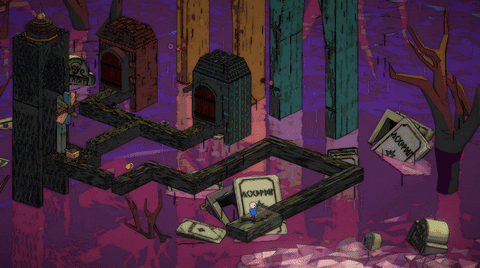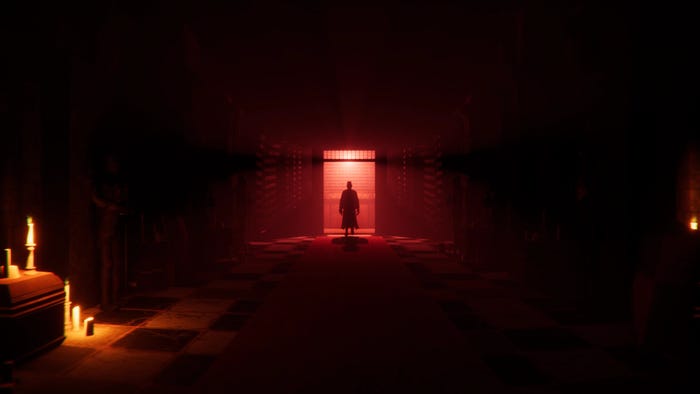PLAY Mephistowaltz's latest, DOOR:Inner Child, explores an emotional journey to explore souls and heal broken hearts. Here, the game's solo dev explores the game's inspirations and goals.

Sponsored by GG Content
Presented by GG Content
DOOR:Inner Child from developer PLAY Mephistowaltz follows the story of Nia, someone living a calm and peaceful life until they are called to go on an adventure into the realm of the soul to heal the wounds of the heart, and experience the world of the mind. It’s a solo-dev indie project that, after three years of development, has just debuted in Early Access on Steam.
Nia’s story progresses through different stages as players collect soul fragments to open doors along the way. Each stage is intended to represent certain emotions and states of the soul and the mind. The atmosphere in each level including the stages’ aesthetic and music is designed to express this. There are stages where you can experience calmness and peace and others where you can feel the sadness and fear.
The mind behind DOOR:Inner Child is indie game developer Hong Minam, founder and CEO of Play Mephistowaltz. He has been developing games for the last few years, including NOTE: A Composer and a Note, also available on Steam.
“Our goal was to have players melt away while playing it. We hoped that the concept would be clear, but still allow for interpretation at certain points in the game in a form akin to modern art,” explains Hong. While NOTE and DOOR appear to be quite different games, Hong says lessons learned in NOTE helped refine concepts present in DOOR.
“While NOTE's concept was clear, it did not leave much to interpretation. In DOOR, stories and settings are expressed through common languages, such as dance, music, and sports. This can be seen in some scenes where they rely on animations without dialogue, or text.”

He has always had a strong interest in writing and in stories. Before becoming a developer, Hong says that he wanted to become a writer, however, he became very passionate about game development when he had the opportunity to attend the Tokyo Game Show in 2016 and meet other developers and gamers.
“Here, I had the opportunity to meet passionate developers from around the world and people who enjoy video games, which made me fall even more in love with game development,” says Hong. “After that, I continued my studies and kept working on games. Thanks to beginner’s luck, my first game was met with great reviews so the expectations I had for myself after that were very high. Looking back now, I think I was a bit arrogant.”
After launching his first game, NOTE: A Composer and a Note, he decided he wanted to share his stories through games, which motivated him to start his company PLAY Mephistowaltz.
With his second game, DOOR:Inner Child, Hong wanted to explore the world of the mind and the soul, as well as confronting and healing the wounds that people carry in their hearts. The concept of the game is based on the phrase “the handle that opens the door of the heart is inside”. According to Hong, this phrase had a very strong impression on him that he decided to design the game around it and focus on expressing this idea.
“I want players to enjoy a world where the mind is expressed in different ways,” explains Hong.
The way in which Nia crosses from one stage to another by opening doors gives a feeling the player is figuring out the way to find the doors blocking the pass to deeper emotions and wounds, and unlock them to reveal them to explore them and understand them.
“As you clear each stage, is its ‘door’ talking about an inner wound?” says Hong. “I hope it is an opportunity for the player to think about their own story. Ultimately, I want to become a person that thinks about and considers the wounds of others.”

Hong calls DOOR:Inner Child an “art platformer” which can be appreciated in the way the game is designed and the emphasis he placed on distinguishing each stage according to a different emotion, some representing calmness and optimism and others representing sadness and despair.
“DOOR's subject matter focuses on mind and emotion. Regardless of nationality, I believe this is a subject matter that is commonly thought about by all people,” says Hong. “I wanted to convey this in a common language without any sort of language barrier (while I personally find poetry beautiful, there are hurdles in the form of education level, interest, and of course translation).Van Gogh's or Roscoe's works caught my eye. I was inspired a lot by their brush touch, their expression of emotion, and their thoughts about their work.”
The inspiration to create the game came in part from the developer’s idea and hope to help this world, even if it was in a small way by exploring and healing the wounds that people carry in their hearts and heal them. That emotional journey is given weight by the game’s art style and music, which work in tandem to invoke emotions ranging from peace, fear, and beyond.
“Both the visual and auditory art styles should be looked at together when telling the emotional story, though the auditory aspects are the main aspect,” Hong says, recalling one moment of inspiration for this relationship. “One clear blue autumn day, I was walking down the street listening to music. The traffic light was red, so I stopped at the crosswalk. Then a lonely song called "HOME IS FAR AWAY" (Epik High) started to play. Suddenly, I thought that if this moment was a scene from a movie in which I was the main character, the audience would think that I was sad.”
“Visual elements, such as blue skies and sunlight, were obscured by auditory elements. I experimented several times by changing the music, and I still found it to be true. This rang true that the auditory element is important. DOOR is carefully setting up the music to convey feelings. It gives simple text and situations (materials of suggestion). Visually (graphically), it was designed using a variety of colors, textures, and luminosity. The objects used on the stage change depending on the emotion, including their texture.”
With DOOR:Inner Child, Hong hopes players enjoy exploring the world of the soul and the mind and for them to think about their own story while playing the game.
“I wanted to help this beautiful world even if it is just in a small way, and as a result, I came up with the idea to talk about the wounds people carry in their hearts.”
He set out to tell a series of stories that touch on a subject that is very complex but very real in today’s world, and that could possibly help the people playing this game to acknowledge their own emotions. This is also the reason why he is developing the game by himself; Hong says that he wanted to express his idea and present his concept and design exactly as he envisioned and has spent the last 3 years, from concept design to prototype creation, to express the game essence precisely as he believes it should be presented.

With DOOR:Inner Child, Hong has attended several game shows and participated in different competitions including the Tokyo Game Show 2019 where he was an “Indie Prize” finalist, Unity Korea where he obtained a top 3 spot for “Best Innovation”, the Seongnam World Game Show where he was the winner of the “World Design” award, and others.
Hong has plans to continue this game as a series and use inner thoughts and dreams as inspiration to develop the game in a way that different stories can be told, similar to a book series. The game is currently on Steam, and the developer plans to bring it to Xbox, PlayStation, and Switch in the future.
Both Hong Minam and his game DOOR:Inner Child are something to look forward to, for he will keep creating incredible stories told through the game that will not only entertain the players but also encourage them to think deeper about their own journey in life.
Read more about:
Sponsor Resource CenterAbout the Author(s)
You May Also Like









